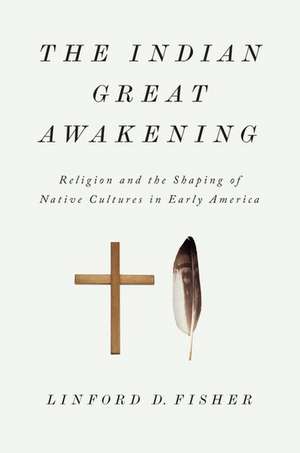The Indian Great Awakening: Religion and the Shaping of Native Cultures in Early America
Autor Linford D. Fisheren Limba Engleză Hardback – 14 iun 2012
| Toate formatele și edițiile | Preț | Express |
|---|---|---|
| Paperback (1) | 260.44 lei 31-37 zile | |
| Oxford University Press – 3 apr 2014 | 260.44 lei 31-37 zile | |
| Hardback (1) | 340.67 lei 31-37 zile | |
| Oxford University Press – 14 iun 2012 | 340.67 lei 31-37 zile |
Preț: 340.67 lei
Preț vechi: 384.59 lei
-11% Nou
Puncte Express: 511
Preț estimativ în valută:
65.19€ • 67.65$ • 54.49£
65.19€ • 67.65$ • 54.49£
Carte tipărită la comandă
Livrare economică 06-12 martie
Preluare comenzi: 021 569.72.76
Specificații
ISBN-13: 9780199740048
ISBN-10: 0199740046
Pagini: 312
Ilustrații: 12 hts
Dimensiuni: 231 x 163 x 28 mm
Greutate: 0.6 kg
Editura: Oxford University Press
Colecția OUP USA
Locul publicării:New York, United States
ISBN-10: 0199740046
Pagini: 312
Ilustrații: 12 hts
Dimensiuni: 231 x 163 x 28 mm
Greutate: 0.6 kg
Editura: Oxford University Press
Colecția OUP USA
Locul publicării:New York, United States
Recenzii
The Indian Great Awakening is a helpful foray into the realm of Colonial social history. Readers will gain new insight and perspective that will challenge Whiggish predispositions.
The history of religious engagement and the spectrum of religious responses presented in The Indian Great Awakening suggest a way to explore Native American perseverance and actions during a period of American history where Indian actors have largely been omitted. Fisher offers evidence of Native presence and elucidates public contestations over Native rights and religions, highlighting the exclusion of Native Americans from earlier national histories. It is my hope that his re-engagement with the history of the Great Awakening from the perspective of Native Americans will serve as an inspiring model and challenge other contemporary scholars to address similar oversights in the historical record.
Thoroughly researched, clearly written, and convincingly argued. ... This book helps us to see more clearly a host of vital dimensions of Native religious engagement with Christianity including the Indian impulses to decide for themselves if how, when, where, and why the claims of Christ would bear on their lives, to control if possible the churches and schools they frequented, and to maintain substantial elements of their cultural heritage when they chose to make Christianity their own. Together those points underscore Native agency, hopes for cultural sovereignty, and quests for community survival, all themes well worth further consideration as other scholars continue to explore the history of Indian Christianization in early America.
A fine exemplar of the maturation of the 'new Indian history,' which places Native peoples at the center of the American past.
The Indian Great Awakening reminds us that religious engagement is both complex and personal. By examining the varied lived experiences of many Native Americans throughout southeastern New England, Fisher has reshaped our understanding of the ways in which these complex people navigated the intersections of race and religion in early America, showing clearly that their varied awakenings are no interpretive ficitions.
Fisher presents significantly more sophisticated interpretations of religious change that emphasize process, contingency, and lived experience over simple notions of conversion.
Rethinking the Scottish Revolution is a detailed and accomplished account of the complex governance of Scotland, and is an invaluable addition to the historiography of the 17th century.
The history of religious engagement and the spectrum of religious responses presented in The Indian Great Awakening suggest a way to explore Native American perseverance and actions during a period of American history where Indian actors have largely been omitted. Fisher offers evidence of Native presence and elucidates public contestations over Native rights and religions, highlighting the exclusion of Native Americans from earlier national histories. It is my hope that his re-engagement with the history of the Great Awakening from the perspective of Native Americans will serve as an inspiring model and challenge other contemporary scholars to address similar oversights in the historical record.
Thoroughly researched, clearly written, and convincingly argued. ... This book helps us to see more clearly a host of vital dimensions of Native religious engagement with Christianity including the Indian impulses to decide for themselves if how, when, where, and why the claims of Christ would bear on their lives, to control if possible the churches and schools they frequented, and to maintain substantial elements of their cultural heritage when they chose to make Christianity their own. Together those points underscore Native agency, hopes for cultural sovereignty, and quests for community survival, all themes well worth further consideration as other scholars continue to explore the history of Indian Christianization in early America.
A fine exemplar of the maturation of the 'new Indian history,' which places Native peoples at the center of the American past.
The Indian Great Awakening reminds us that religious engagement is both complex and personal. By examining the varied lived experiences of many Native Americans throughout southeastern New England, Fisher has reshaped our understanding of the ways in which these complex people navigated the intersections of race and religion in early America, showing clearly that their varied awakenings are no interpretive ficitions.
Fisher presents significantly more sophisticated interpretations of religious change that emphasize process, contingency, and lived experience over simple notions of conversion.
Rethinking the Scottish Revolution is a detailed and accomplished account of the complex governance of Scotland, and is an invaluable addition to the historiography of the 17th century.
Notă biografică
Assistant Professor of History, Brown University















